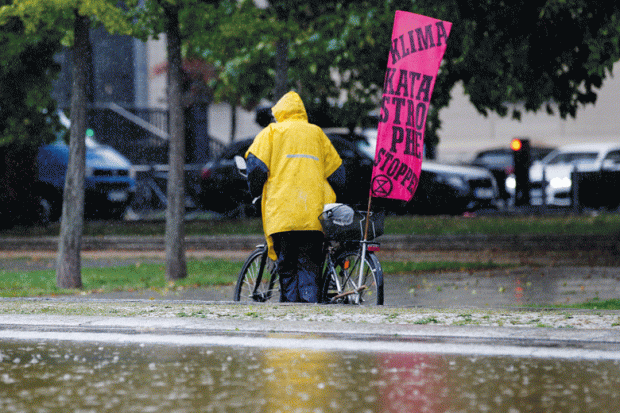German climate scientists are weighing up how to deal with a new campaign by the far-right to deny that human actions are causing climate change, facing a similar dilemma to colleagues in other countries over whether to ignore or challenge such claims.
Alexander Gauland, the leader of the Alternative for Germany, which came third in the country’s 2017 federal elections, has said that attacking the climate agenda would become the party’s third key message, alongside opposition to the euro and immigration.
The party is preparing documentary-length films to challenge climate targets, while its environment spokesman has claimed climate change is down to fluctuations in the Earth’s orbit and water vapour in the atmosphere, reported the Sunday newspaper Welt am Sonntag.
But a number of German scientists told Times Higher Education that they believe publicly arguing with the AfD was pointless.
“Public debates are in my view counter-productive,” said Stefan Rahmstorf, head of Earth system analysis at the Potsdam Institute for Climate Impact Research. “It’s like asking Nasa experts to join a public debate on whether Apollo 11 actually landed on the Moon.”
Such confrontations were a “no-win” situation for scientists, Professor Rahmstorf said. “A lay audience cannot judge which scientific-sounding arguments are actually correct; the more eloquent person will come across better no matter whether his science is right; and what most will remember from such a debate after a few months is the false idea that ‘the experts disagree’,” he said. Instead of public debate, Professor Rahmstorf said he preferred tackling scientific errors through blogging.
The Mercator Research Institute on Global Commons and Climate Change, a Berlin-based research centre, also refuses to comment on AfD climate positions in the media or give the party a place on public debates about climate change, said Brigitte Knopf, the organisation’s secretary general.
“We do not want to provide appreciation for a position that is rejecting the overwhelming scientific evidence of man-made climate change,” she said. “The acceptance of basic scientific facts and a minimum of mutual respect and willingness to listen is required – and AfD is missing that.” The Mercator institute does, however, invite party representatives to its events that are not open to the public or media.
Denial of man-made climate change by AfD politicians is not new. But its decision to make the issue a central party message follows an upsurge in environmental concern in German politics. On 20 September, the federal government announced a €54 billion (£47.8 billion) package to help cut emissions – on the same day that a reported 1.4 million protesters took to the streets of German cities to demand more action on climate change. The Green Party is currently polling in second place behind Angela Merkel’s ruling Christian Democratic Union.
Nor is there anything new about scientists grappling with how best to engage with those who question man-made climate change – including US president Donald Trump, who once called the phenomenon a “Chinese hoax” – as well as other anti-science trends like the anti-vaccination movement.
Some research suggests climate beliefs are tied to identity, making them impervious to argument. One 2015 study in Nature Climate Change concluded that, at least for the US, this means that “divisions between sceptics and believers are unlikely to be overcome solely through communication and education strategies”.
But another German study, published last month, suggests that, in certain circumstances, engaging with science “deniers” in front of an audience can be fruitful, and does not “backfire”, reinforcing sceptics’ beliefs, as some academics fear.
When scientists rebutted anti-vaccination campaigners in debate with established facts about vaccine safety, or unmasked how they were misleading the audience – through cherry-picking papers, or demanding 100 per cent certainty from science – this reduced the influence of their opponents on the audience, found the paper, published in Nature Human Behaviour.
Whether groups like the AfD should be debated by scientists depends on whether or not they already had a broad audience, argued Philipp Schmid, co-author of the paper and a researcher at the University of Erfurt. If they already had a following, it made sense to challenge them, he said, because if left unchallenged they will cause the “greatest damage”.
The consensus among academics was that “trying to convince a denier, especially in public, will most likely fail”, he said.
However, this did not mean that academics should not engage in debate. “We can address the so-called fence-sitter and we can also equip advocates with knowledge on how to defend their perspective against denialism,” Mr Schmid said.
后记
Print headline: Dilemma over new attack on climate science in Germany





